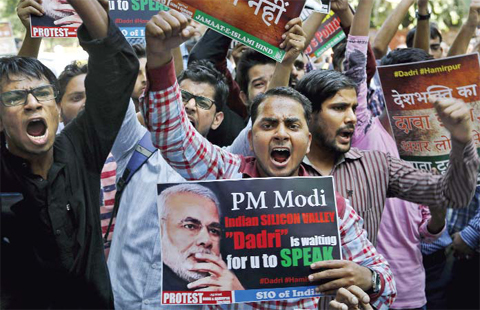NEW DELHI: In this Oct. 6, 2015 file photo, activists of various Indian Muslim groups shout slogans against Indian prime minister Narendra Modi during a protest against the killing of a Muslim farmer by villagers upon hearing rumors that the family was eating beef, in New Delhi, India. The chorus of Indian intellectuals protesting religious bigotry and communal violence grows louder by the week with a single message for prime minister Narendra Modi: Assure the multicultural nation that the government stands for secularism and diversity. — AP
NEW DELHI: First writers then artists, followed by filmmakers, historians and scientists. The chorus of Indian intellectuals protesting religious bigotry and communal violence grows louder by the week with a single message for Prime Minister Narendra Modi: protect India’s tradition of secularism and diversity.
Those protesting are angry and worried by a spate of deadly attacks against atheist thinkers and minorities, and by Modi’s relative silence through it all. That silence appears to have encouraged some of his party colleagues to make comments asserting Hindu pride and superiority.
On Thursday, more than 100 scientists, including some of India’s top nuclear physicists, space scientists and mathematicians, expressed their anguish at the ways in which they said "science and reason were being eroded in the country.” The protest by scientists is significant, given that most work for the government or in state-funded organizations and so could risk being punished for speaking out. "What we are witnessing instead is the active promotion of irrational and sectarian thought by important functionaries of the government,” the scientists said in a statement.
They said the dozens of Indian writers who have returned national awards in protest had "shown the way.” The uproar among intellectuals began in late September, when a village mob beat a Muslim man to death and put his son in critical condition over rumors that their family was eating cow meat. In fact, it had been a goat. Ten people have been arrested in connection with the attack. There have been other incidents in recent years, including the killings of three atheist scholars who had campaigned against religious superstition, and more mob killings over rumors of cow slaughter or smuggling.
Many Hindus, who make up more than 80 percent of India’s population of 1.25 billion, consider cows to be sacred, and many states ban the slaughtering of the animals. Communal violence and prejudice are nothing new for India, born as a secular democracy in 1947 amid deadly Hindu- Muslim riots that killed an estimated 1 million people as Muslim-majority Pakistan was carved out of mostly Hindu India with the end of British rule. Since then, horrific riots and clashes have erupted at intervals, mostly between Hindus and Muslims. Yet India has still largely been seen as overwhelmingly tolerant, with a cacophony of cultures that have lived side by side for centuries. Secularism is enshrined in its constitution.
Fascist revolt
Some political analysts said that the protests were going too far in making it seem like India was on the brink of a fascist revolt, and that the government may simply be stumbling in its communication strategy. Modi has no media spokesman, instead relying largely on senior ministers and his official website to get his messages out. "If you look at the history of religious violence in India, it is far less today than it was three decades ago,” analyst Ashok Malik said. "This is part of the democratic discourse in India. While I’m not doubting the concerns of writers and artists, their use of words like ‘fascist’ is over the top.”
Worries over India’s secular identity began rumbling before Modi was elected prime minister last year. Modi and his Hindu nationalist Bharatiya Janata Party won the election in a landslide, largely on promises of lifting the economy. But some cautioned that his support was grounded in the party’s Hindu base, and noted that Modi himself had come up through the militant Hindu fundamentalist organization Rashtriya Swayamsevak Sangh, which translates as the National Volunteers Association. For years, the group has been accused of stoking anti- Muslim prejudice, including among teenagers attending youth camps. — AP



